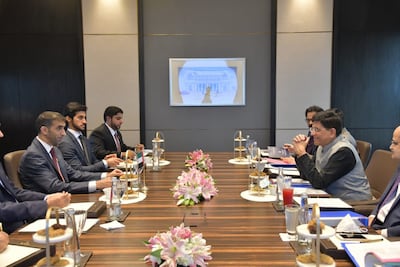The UAE and India are discussing a Comprehensive Economic Partnership Agreement (CEPA) that could boost the value of non-oil trade between the two nations to $100 billion in five years, the UAE’s Ministry of Economy said.
The talks mark a new phase of strategic co-operation between the two countries, the ministry said in a statement on Wednesday. The initiative will broaden economic and investment horizons and boost bilateral trade ties with India.
“The CEPA builds on these historic ties by laying the foundation for a mutually beneficial partnership that creates new jobs, promotes foreign direct investment, empowers entrepreneurs, attracts talent and accelerates our knowledge-driven economies,” Thani Al Zeyoudi, the UAE Minister of State for Foreign Trade, said.
“It will strengthen our position as a global gateway to Africa, Asia and Europe, driving economic growth and prosperity across the region,” said Mr Al Zeyoudi, who led an official delegation to New Delhi for talks.

India is now the UAE’s second-largest trading partner, accounting for 9 per cent of the Emirates’ total foreign trade and 13 per cent of non-oil exports. Bilateral trade between the two nations reached $21bn, growing at an annualised rate of more than 70 per cent in the first six months of this year, ministry data shows.
The value of the UAE’s non-oil trade with India may rise from pre-pandemic levels of $40bn to over $100bn within the five years of the CEPA being signed.
The UAE's non-oil foreign trade last year reached Dh1.4 trillion ($381.47bn). China retained its top rank as the main trading partner of the UAE, with the value of bilateral trade reaching Dh174bn, followed by Saudi Arabia at Dh104bn and India with Dh102.5bn in third place, data released by the Federal Centre for Competitiveness and Statistics earlier this month showed.
The UAE, the commercial and trading hub of the Middle East, has maintained a strong trade momentum despite pandemic headwinds. It is keen to further strengthen its relations with key trading partners as the global economy recovers and trade rebounds.
The International Monetary fund expects the global economy to expand by 6 per cent in 2021 after it tipped into a deep recession last year. The volume of world merchandise trade, which slumped 5.3 per cent in 2020, is expected to grow 8 per cent in 2021, World Trade Organisation estimates show.
This is the second CEPA deal that Mr Al Zeyoudi has commenced talks on this month, following negotiations with Indonesia.
This initiative comes at a “very crucial time as we brace ourselves and set economic priorities for the post-pandemic era,” Ahmed Al Banna, the UAE’s ambassador to India, said.
“Now is the time for the UAE and India to work together and take co-ordinated actions to achieve our ambitious bilateral trade target of $100bn. Besides trade, we are keen to augment investment flows and lead the world by example,” he added.
The two nations over the years have signed several major foreign direct investment deals.
In June last year, Abu Dhabi’s strategic sovereign fund Mubadala Investment Company invested $1.2bn in India’s telecomms provider Jio Platforms. In 2019, UAE entities committed $7bn to create a food corridor between the UAE and India to provide a stable market for farmers in the Indian states of Punjab, Madhya Pradesh, Uttar Pradesh and Gujarat.
India’s business conglomerate Reliance recently announced an investment of $2bn in Abu Dhabi’s TA’ZIZ Industrial Chemical Zone.


